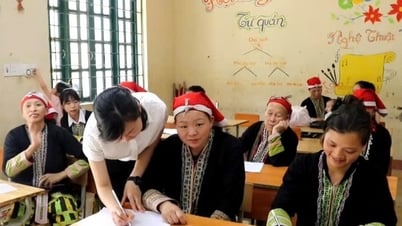The programs, open learning environment and safety measures for international students make New Zealand high schools attractive to Vietnamese parents.
In 2022, Vietnam will become the country with the largest number of international students studying in New Zealand in Southeast Asia. The most popular level of education is secondary school, according to Mr. Ben Burrowes, Regional Director for Asia ofEducation New Zealand.
Between 2017 and 2019, the number of Vietnamese high school students studying abroad increased by a record 80%. This number is on the rise after New Zealand opened its borders last August.
According to Mr. Ben, New Zealand has a national education program (NCEA) with core subjects such as STEM ( Science , Technology, Engineering, Mathematics). In addition, students can choose subjects that suit their personal abilities and passions.
With this program, high school students create their own suitable learning path. Combined with an open learning environment that emphasizes two-way interaction, students are encouraged and enhanced in their ability to think independently.
"We provide core subjects, but at the same time give students autonomy and the right to make their own decisions," said Mr. Ben, who said this is what attracts Vietnamese parents.

Photo: Studywithnewzealand
High school in New Zealand is also of interest to Vietnamese parents because of the safe environment for international students.
Ms. Banh Pham Ngoc Van, Vietnam Market Director, Education New Zealand, said that this is the first country to have a Code of Conduct for the Support and Care of International Students. Accordingly, schools must comply with many requirements to ensure that international students have safe accommodation and receive dedicated care.
For example, international students under 18 years old are not allowed to stay alone or in dormitories but are required to stay with homestay parents or homestay families.
Having lived and hosted international students in New Zealand for 16 years, Lien Trinh said that schools are responsible for finding accommodation for international students. In Wellington, where Lien lives, schools often prioritize choosing teachers and staff families as hosts.
"Schools think that being in academic families will encourage students to go to university later," Ms. Lien shared at the New Zealand Study Abroad Fair in mid-October.
According to Ms. Lien, the school sends out questionnaires and carefully screens the families’ profiles. The homeowner must list the number of people, nationality, cooking and eating habits of the family; amenities such as dehumidifiers and heaters; and whether anyone smokes.
"They were very thorough, they came to meet the homeowner, checked each room, even turned on the hot water... Truong interviewed for a long time, asked about living habits, and whether the house was near the market or bus stop," said Ms. Lien.
This will be checked 3-4 times before a family is placed on the waiting list for an international student. The school will then meet with the family to provide guidance on how to support the student.
On the student side, their families will work with the school through the study abroad consulting center. A list of hosts suitable for nationality, personality, and English level will be sent to the parents for selection.
In addition, schools pay great attention to students' mental and spiritual health. In addition to eating, sleeping, and room conditions, international students will be supported in communication, culture, etc. to integrate and ease homesickness.
"Many students study abroad from the end of middle school, their age changes psychologically and physically, they cannot live near their parents, so the landlord must take responsibility," said Ms. Lien.
The quality of education and safe environment are the reasons why Ms. Nguyen Thi Trang, Ha Dong District, decided to send her daughter to high school in New Zealand. Her daughter is currently in grade 12 at Middleton Grange School, in Christchurch City.
Before going to New Zealand, she and her child sent to the school the hope of finding a host with a garden and pets. In the end, she let her child stay at a teacher's house at the school. She regularly exchanged information and the child's situation with the host via email, WhatsApp, or messenger. After the trip to New Zealand a few months ago, Ms. Trang felt more secure.
According to her, the landlord is friendly and understanding, often inviting the children to go out with them on holidays. They also organize birthday parties and buy things for the children. They understand the problems that the children have in studying or psychologically, they talk to them and share with them.
"The landlady also prepares breakfast and dinner or buys ingredients to cook Vietnamese dishes to help her children feel less homesick," said Trang.
Dawn
Source link


![[Photo] More than 17,000 candidates participate in the 2025 SPT Competency Assessment Test of Hanoi National University of Education](https://vphoto.vietnam.vn/thumb/1200x675/vietnam/resource/IMAGE/2025/5/17/e538d9a1636c407cbb211b314e6303fd)

![[Photo] Readers line up to visit the photo exhibition and receive a special publication commemorating the 135th birthday of President Ho Chi Minh at Nhan Dan Newspaper](https://vphoto.vietnam.vn/thumb/1200x675/vietnam/resource/IMAGE/2025/5/17/85b3197fc6bd43e6a9ee4db15101005b)


![[Photo] Prime Minister Pham Minh Chinh chairs meeting on science and technology development](https://vphoto.vietnam.vn/thumb/1200x675/vietnam/resource/IMAGE/2025/5/17/ae80dd74c384439789b12013c738a045)



























![[Photo] Nearly 3,000 students moved by stories about soldiers](https://vphoto.vietnam.vn/thumb/1200x675/vietnam/resource/IMAGE/2025/5/17/21da57c8241e42438b423eaa37215e0e)






































































Comment (0)